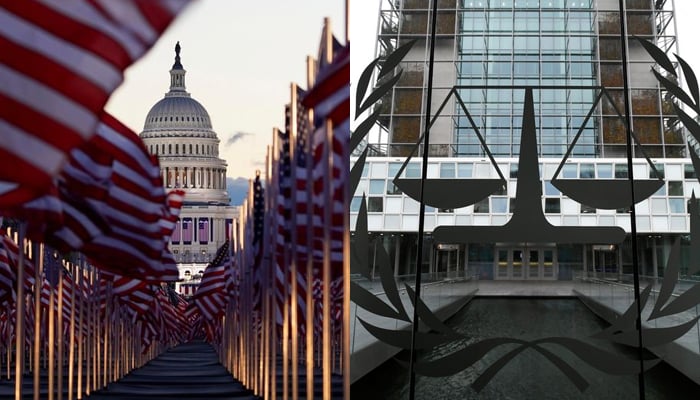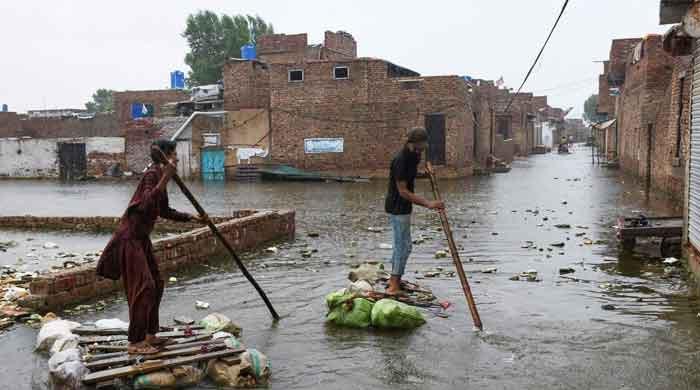The budding romance of the US and ICC
No matter how intense the pressure is from int'l media, foreign diplomats, the ICC doesn’t seem to rat on its better half
October 07, 2021

It was not surprising. Rather, the statement from the new chief prosecutor of International Criminal Court, Karim Khan, about the court wanting to employ "limited resources" to focus on the Taliban and Daesh-Khorasan, instead of probing the US for alleged war crimes, seems exceedingly comical in the sense that he thought that his excuse would be taken literally.
History repeated itself with the conclusion by the US of yet another military adventure in a manner not so different from that of Vietnam, Iraq, Somalia — and the list continues. However, the factor that remained shamelessly constant in the aftermath of all these failed enterprises, was the fractured response of the ICC over the prosecution of alleged war crimes. Alleged they might be, but independent media reports and on the ground sources have a narrative that tells a different tale.
The alleged war crimes committed by the US in Vietnam, Iraq, and Somalia were never adequately prosecuted. The ICC, a body that officially came into existence on July 1, 2002, is required to ensure that even war has some sense of humanity to it, although it becomes numb when it comes to the US.
I like to call it "their budding romance" because no matter how intense the pressure is from international media and foreign diplomats, the ICC doesn’t seem to rat on its better half. This affair, however, doesn’t seem to be a two-sided venture, rather an enforced one — a marriage that exists only because neither of them has anywhere else to go.
The US policies vis-à-vis the ICC have always been authoritarian. Just months after the international body was deemed operational, the then US president, George W Bush, passed an undemocratic act called American Service-Members' Protection Act (ASPA).
The act, as per official documents, limits US government support and assistance to the ICC, curtails certain military assistance to many countries that have ratified the Rome Statute establishing the ICC, regulates US participation in United Nations peacekeeping missions commenced after July 1, 2003, and, most controversially among European allies, authorises the president to use all means necessary and appropriate to bring about the release of certain the US and allied persons who may be detained or tried by the ICC.
This non-cooperation movement against the ICC clearly originates from a severe sense of fear that their humanitarian intervention might be labelled as humanitarian crises, or worst and truthfully, human ignorance. There is no hiding from the fact that US atrocities, during foreign invasions, know no limits.
In response to the Biden administration’s crackdown on China on the issue of Uighur Muslims, the China Society for Human Rights Studies lashed out at the US in an article, calling them out for severe humanitarian disasters caused by its aggressive wars against foreign countries. According to the article, from the end of the Second World War to 2001, roughly 248 military conflicts occurred in 153 regions around the world, of which the US waged 201, accounting for 80% of all wars worldwide.
What remained constant in all those military conflicts was the brutal ignorance of human rights by the US military. The article said that General Wesley Clark, a retired 4-star US Army general, told media in 2017 that he was told by one of the generals that the US was going to war with Iraq. Clark wondered if the decision was made because they found some information connecting Saddam to Al Qaeda, but he was told no.
"There's nothing new that way. They just made the decision to go to war with Iraq," Clark said. "I guess it's like we don't know what to do about terrorists, but we've got a good military and we can take down governments." And he said, "I guess if the only tool you have is a hammer, every problem has to look like a nail."
The recent response from ICC with regard to investigating the US military’s war crimes in Afghanistan came as an insult to the international community. After the US military accepted that its recent drone strike in Afghanistan was another misadventure and apologised to the families of those deceased, the ICC should come down rather hard on the US. Instead, the institution betrayed the very foundation over which it was built.
The ICC prosecutor seeks to resume the Afghanistan war crimes probe with a focus on Taliban and Daesh, but not US forces.
This move by the ICC would give an excuse to other emerging powers to exercise their influence over the ICC and avoid prosecution altogether. This would mean that all you have to do, to exercise the military adventure of your liking, is to somehow build leverage on the ICC, or better yet, its chief prosecutor.
ICC, meanwhile, says that the change in priority came after the fall of the Afghan government at the hands of the Taliban and the foundation of the new "Islamic Emirate".











